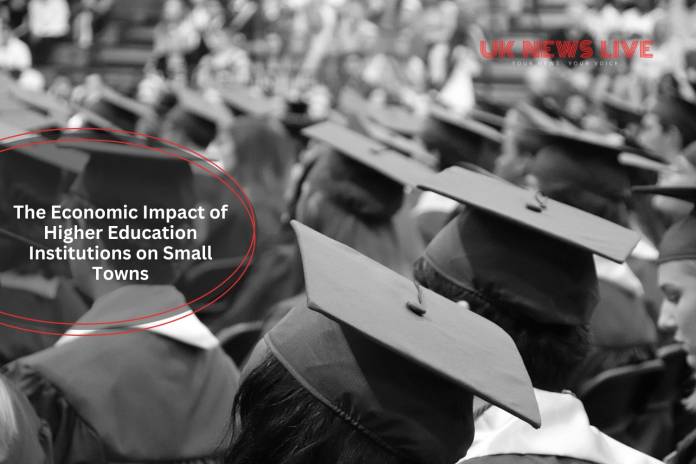Higher education institutions (HEIs) are often seen as the heart of vibrant academic communities, fostering innovation, and driving social change. Beyond their educational roles, universities and colleges in the UK significantly influence the economic landscape of the towns they inhabit, especially smaller towns.
This article explores the positive economic impact of HEIs on small towns across the UK, highlighting how these institutions bolster local economies, support job creation, and enhance community development.
1. Job Creation and Economic Stimulation

One of the most direct economic impacts of universities and colleges is job creation. Generally, universities act as economic catalysts, with each individual directly employed by them supporting the creation of approximately one additional job in the immediate local economy (University and College Union).
This statistic underscores the multiplier effect that HEIs have on employment within their host towns. For instance, small towns like St Andrews, home to the University of St Andrews, benefit immensely from the university’s employment opportunities. The presence of a top university often means a steady influx of academic and administrative staff, all of whom require goods and services, thereby supporting local businesses.
2. Supporting Local Businesses
The economic activity generated by universities extends beyond direct employment. In the UK, higher education institutions (HEIs) contribute to a substantial number of jobs, with over three-quarters of a million positions supported (Universities UK). Notably, around half of these jobs are indirect positions, which are sustained by local businesses such as restaurants, retailers, and service providers.
In counties like Lancashire, the presence of Edge Hill University has led to a thriving local economy where student accommodation in Ormskirk plays a pivotal role. The demand for housing has spurred the growth of the real estate sector, with new developments and refurbishments aiming to attract more students. This influx not only benefits landlords and property developers but also has a knock-on effect on local tradespeople, maintenance services, and retail businesses.
3. Enhancing the Local Workforce

A university serves as a significant contributor to the local workforce by supplying educated and skilled individuals, while also enhancing local businesses’ knowledge and technological advancement. In towns like Aberystwyth, home to Aberystwyth University, graduates often stay on after completing their studies, enriching the local talent pool. This continuous supply of skilled graduates helps local businesses to innovate and grow, leveraging the latest research and technologies developed within the university.
4. International Students and Economic Contributions
The impact of international students on small town economies is particularly significant. According to a House of Lords Library report, the economic output of the UK higher education sector is estimated to be at least £116bn, with the estimated total benefit to the UK economy from 2021/22 first-year international students over the duration of their studies was approximately £41.9 billion.
Small towns with HEIs attract a considerable number of these international students, who bring diversity and substantial economic contributions. Their spending on tuition, accommodation, and living expenses directly injects money into the local economy, supporting jobs and businesses.
5. Community Development and Cultural Enrichment

Beyond economic metrics, universities play a vital role in community development and cultural enrichment. They host events, public lectures, and cultural activities that engage the local population and foster a sense of community. Even in small cities like Durham, the presence of Durham University creates a vibrant cultural scene with numerous festivals, art exhibitions, and community projects. These activities enhance the quality of life for residents and make the town an attractive place to live and work.
6. Infrastructure and Urban Development
The presence of a university often leads to significant investments in local infrastructure and urban development. Towns with HEIs frequently see improvements in transport links, public spaces, and amenities to cater to the needs of the student population and university staff. In Falmouth, the University of Exeter’s Penryn Campus has led to substantial investments in local infrastructure, benefiting both the university community and the town’s residents.
Conclusion
The economic impact of higher education institutions on small towns in the UK is profound and multifaceted. Universities and colleges not only create jobs and support local businesses but also enhance the local workforce, attract international students, and contribute to community development. Towns like Ormskirk, St Andrews, Aberystwyth, Durham, and Falmouth illustrate the significant benefits that HEIs bring to their local economies. As these institutions continue to grow and evolve, their role in shaping the economic and social landscapes of small towns remains indispensable. Through strategic investments in education and community engagement, HEIs will continue to drive economic growth and enrich the lives of those in their host towns.
































